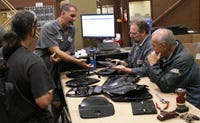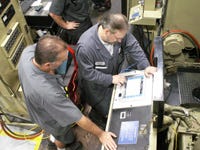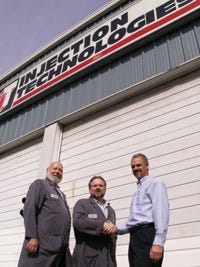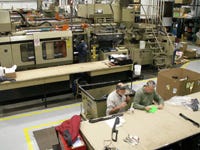Investing in IM control retrofits pays off for mold testing firm
Supplying full-service custom injection molding tryout services on time and on budget is nothing new for Injection Technologies Inc. (IT), a Windsor, ON company with nearly two decades of service to the automotive and other industries. However, thanks to a planned plantwide upgrade to Eurotherm’s Maco Compact controls, IT’s product now meets higher production quality standards than ever before, in less time and with less waste.
April 9, 2009
Supplying full-service custom injection molding tryout services on time and on budget is nothing new for Injection Technologies Inc. (IT), a Windsor, ON company with nearly two decades of service to the automotive and other industries. However, thanks to a planned plantwide upgrade to Eurotherm’s Maco Compact controls, IT’s product now meets higher production quality standards than ever before, in less time and with less waste.
|
That’s important to a company that has built its reputation on providing test or short-run molded parts to more than a thousand clients. The company also does gas-assist molding, structural foam molding, PVC-overshoot molding, and more using identical control parameters on subsequent tests with the aid of computer control and job recipe storage.
“We work with an entire group of injection moldbuilding shops, in Windsor and throughout Canada and the U.S.,” explains Ken Field, IT’s GM. “Our customers build the molds, then send them to us to run 10, 30, perhaps 300 parts and ship them back for testing and approval. These test runs are a cost-effective way to make any tooling changes before the final customer puts a mold into production.”
IT’s success comes from many sources: knowledgeable staff with average tenure of more than 10 years, commitment to exceptional customer service, and an equipment mix that meets the needs of a diverse customer base. That diversity means precise control and fast turnaround are critical to IT, which runs 11 injection molding presses ranging from 130-3500 tons in its nearly 50,000-ft2 facility. This wide range of specialized machinery allows the company to efficiently set up and test a variety of parts while varying all critical injection molding parameters.
“All of our machines were custom-ordered to meet the wide range of needs,” says Field. “We can put a 20-inch-thick shutter mold in the 2200-ton machine and then can try out a garbage pail mold on the same press right after it. We really haven’t found a job that we couldn’t try out due to mold size or material type.”
Since fast turnaround is critical, IT’s reputation depends on meeting its customers’ parameters. “When customers book a trial, they need it in two days—they can’t wait a third day,” Field says. “Customer schedules change, and everything is a lot tighter than what it used to be years ago. We’ve gone from scheduling of days to hours, and we do our best to work within these tight deadlines.”
Time equals money to a test facility. When Fields and Rick Stieler, IT plant manager, saw machine downtime due to control board problems, they knew it was time to improve that part of the operation. “At times, downtime due to machine control issues hurt our business. We would have to take out the card, drive it 3 hours to the press builder, have the program changed, and then have someone else bring it back to the shop. Sometimes a press might be down an entire day.”
Also, because IT has several presses with the same control, interchangeability was a key factor. “We realized that a control upgrade would allow us to continue making the required improvements needed to support our customers,” says Stieler. “Tighter processing windows, more process capabilities, excellent data collection, and improved response times would allow us to do that better than ever before.”
New control strategy means better performance and data collection
IT’s answer was a control upgrade to improve reliability, ease of maintenance, and overall machine performance. Their choice, the Maco Compact, is a cost-competitive, general-purpose programmable logic control providing integrated, total machine control in a compact package. It supports either open- or closed-loop Impact II injection process control. The Impact II control also creates a theoretical model of the process after a few runs to automatically optimize it in compensation for deviations in the process. Precise adaptive automatic tuning is included for temperature control. SPC calculations and charts can be viewed on Eurotherm’s new line of Optima CE touch-screen displays.
Stieler says a few added benefits have been especially useful:
• Core-pull option. “We now can run our core pull using timers, which we never had the capability to do before. With the new control, we are able to have different sequences programmed when we need them, in a short period of time, and with very little expense incurred.”
• An additional oversized monitor. “The monitor is displayed for customers to be able to view real-time changes across the table from the operator. They can discuss changes that should be made and the operator can make those changes without a crowd of customers around the machine control.”
• Two-stage knockout control. “This control allows us to program a two-stage knockout in which we can move the knockout slowly at the beginning and then speed it up when a part is free.”
• Improved accuracy. “We have noticed an increase in accuracy of all major functions, including platen control, knockout injection, and screw reverse speeds. We are also finding that our settings are being matched repeatedly. The new control accepts our entries and they come into effect immediately. Having the ability to easily get programs changed or added is a huge advantage, especially as we are constantly trying new processes and sequences for our customers’ experimental parts.”
The need for a quick retrofit
The first machine’s retrofit timing was a tight one, adding to the overall challenge. The programming was completed in the Eurotherm home office, but the controls then required testing and debugging in the field.
Eurotherm value-added reseller Dave Hubble helped the retrofit, planned over a 24-month period, go as smoothly as possible, says Field. “As a test case, we chose one of the three 700-tonners. And we’ve already ordered one for our 500-ton along with a planned install for new screw and barrel. We’re working out any programming bugs on these two machines. After that, they’ll come in on a Thursday afternoon, rip it out, put the new one in, the program will be set, and we’ll be up and running by Tuesday.”
Fields says that the retrofit gives IT increased confidence to do what customers want from their molds—accuracy, uptime availability, and all of the bells and whistles in machine control. “Our goal is to take our excellent existing molding machines and make them better,” states Stieler. “And that’s what we think the Maco Compact controls have done for us. We’re looking forward to making the smart investment in retrofitting all of our injection molding machines over the next two years.” —[email protected]
About the Author(s)
You May Also Like






